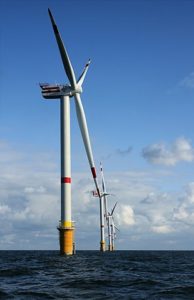
During his plenary talk, Mark Jacobson (Stanford University) presented a striking vision for a worldwide transition to 100% clean renewable energy from wind, solar and hydroelectricity.
 Although this may seem unachievable at first, such a transition could be aided by the efficiency of electricity over combustion, reducing power demand in transportation. Meanwhile, elimination of energy uses in fossil fuel mining and transportation would reduce worldwide energy demand. Jacobson presented roadmaps for 139 countries, together with computer modelling to show that power grids would remain stable (supply could meet demand), at lower cost than fossil fuels, whilst creating employment.
Although this may seem unachievable at first, such a transition could be aided by the efficiency of electricity over combustion, reducing power demand in transportation. Meanwhile, elimination of energy uses in fossil fuel mining and transportation would reduce worldwide energy demand. Jacobson presented roadmaps for 139 countries, together with computer modelling to show that power grids would remain stable (supply could meet demand), at lower cost than fossil fuels, whilst creating employment.
Jacobson’s work has been the subject of scientific debate, with his 2015 publication on a clean energy transition for the US in PNAS garnering criticism that Jacobson felt contained factual errors. He responded with a defamation suit against the journal, before later dropping his complaint.
According to Jacobson’s research, public opinion is strongly in favor of renewables, with 82% worldwide in support of transition to 100% renewable energy. He emphasizes that whilst the cost of renewables is comparable to fossil, there is a much greater social cost of fossil fuel pollution, in terms of health and climate. The main barriers to transition are social and political.
 The production of biofuels from biomass is absent from Jacobson’s model of clean energy as it is viewed as polluting. He suggests that all vehicles, including planes, can run on either electricity or hydrogen. However, as speaker Stephen A Miller pointed out in his talk – Would you really want to fly in a battery operated plane? Miller presented research on the high yielding oil crop carinata or Ethiopian mustard, that is used to produce aviation fuel. Although this renewable is still more expensive to produce than fossil-based, Miller’s work explores bio-based chemicals that could be co-produced with the fuel to increase profit, such as polyesters, polyamides and preservatives.
The production of biofuels from biomass is absent from Jacobson’s model of clean energy as it is viewed as polluting. He suggests that all vehicles, including planes, can run on either electricity or hydrogen. However, as speaker Stephen A Miller pointed out in his talk – Would you really want to fly in a battery operated plane? Miller presented research on the high yielding oil crop carinata or Ethiopian mustard, that is used to produce aviation fuel. Although this renewable is still more expensive to produce than fossil-based, Miller’s work explores bio-based chemicals that could be co-produced with the fuel to increase profit, such as polyesters, polyamides and preservatives.
Several articles published in Biotechnology for Biofuels explore the feasibility of biofuel based aviation in terms of cost and emissions reduction. For example, Sierk de Jong and colleagues compare feedstock and production pathways, leading to substantial reductions in Green House Gas (GHG) emissions compared to fossil fuels ranging between 60-104%. Meanwhile, Guolin Yao and colleagues calculate the costs of bio-based jet fuel production and the risks to potential investors, taking into account variation in revenues from bi-products, that influence profitability.
Complete decarbonisation of energy supplies seems unlikely, and January 2018 saw the first ever biofuel powered Qantas flight between the US and Australia, using a blend of 10% carinata biofuel, reducing GHG emissions by 7%. Biofuels based aviation is more expensive, and until oil prices inevitably rise, they are only going to be used with a view to decreasing emissions. However, with Qantas looking to expand its use of biofuel and other airlines also experimenting, it seems like the aviation industry at least, is looking to go green with biofuels.
- Biotechnology for a bio-based economy - 5th June 2019
- Sustainable energy at the American Chemical Society Spring meeting - 11th April 2018
- Biotechnology for Biofuels – Special Issue on Life Cycle Analysis - 17th May 2017
Comments